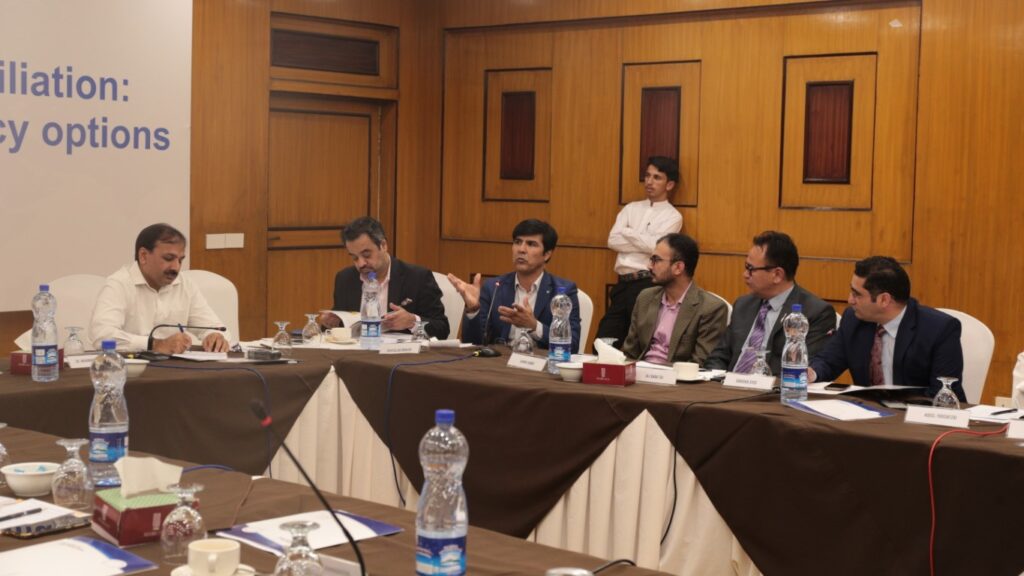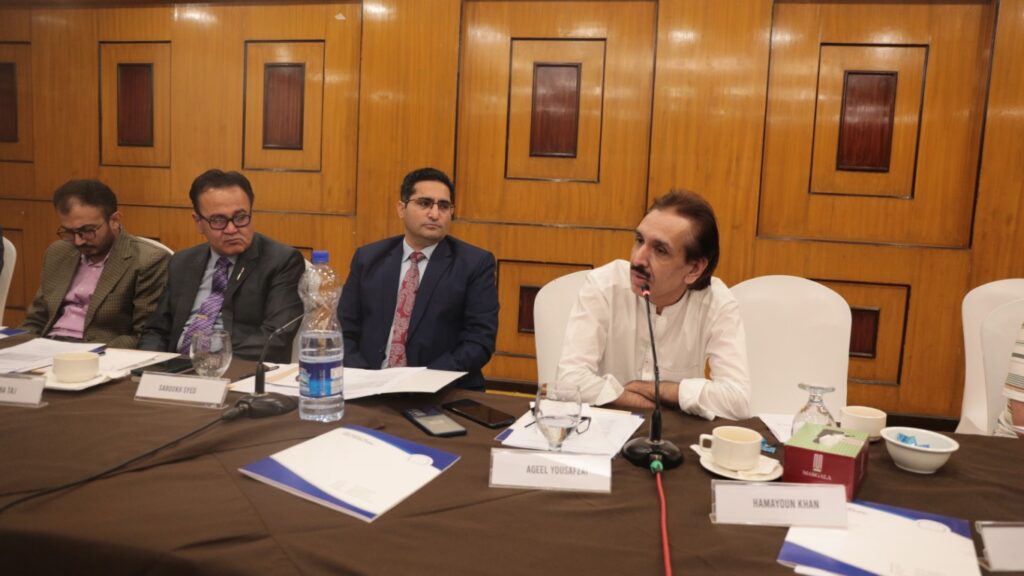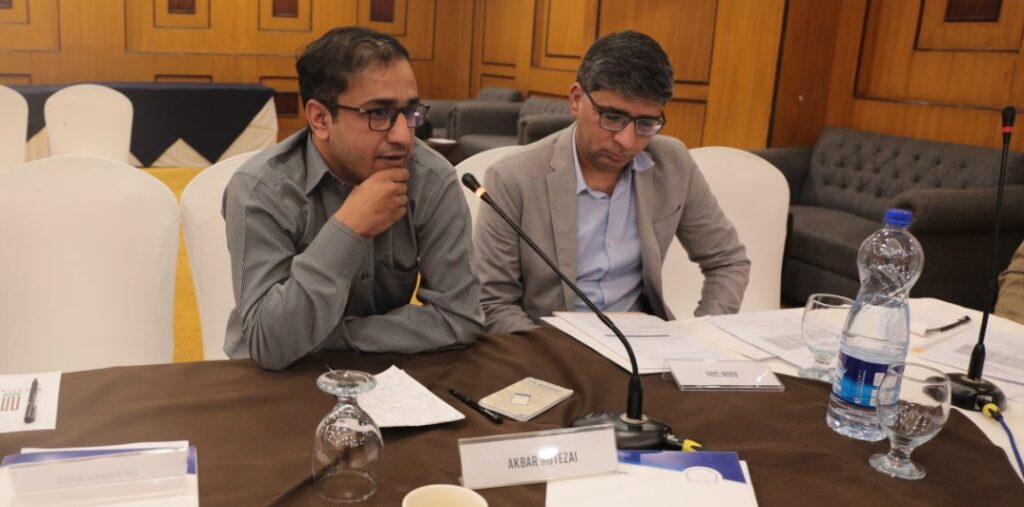Pak Institute for Peace Studies (PIPS) organized its 8th quarterly consultation on “Afghan peace and reconciliation: Pakistan’s interests and policy options” on May 4, 2023 in Islamabad.
The main themes of the consultation, which was the last one in a series of eight discussions organized by the institute on Afghan peace process, included “Pak-Afghan bilateral relations: challenges and way forward” and “Emerging Afghan situation and its implications for the region.”
The representatives of political parties and civil society, academics, and journalists, among others participated in the discussion. Journalist and researcher Imran Mukhtar, and Joint Director PIPS Safdar Sial moderated the two sessions respectively.
Experts at the discussion warned that banned Tehreek-e-Taliban Pakistan (TTP) was making new nexus with Baloch separatists and local militant groups based in Khyber Pakhtunkhwa (KP) and Balochistan — a development which will likely exacerbate the already precarious security situation in the country.
Unlike the past, this is for the first time that the TTP has started carrying out terrorist attacks in Pashtoon areas of Balochistan, which is very disturbing, they also said.
There is no clarity about Pakistan’s policy for Afghanistan and the ruling coalition in the center is also unclear how to deal with the TTP since talks with the proscribed group failed last year, they added.
The discussants highlighted that the banned group based in Afghanistan and other local militant groups were filling the vacuum left by mainstream and nationalist political parties in KP as they were no longer only jihadi-religious groups. They further said that these militant groups now promoted political and nationalists thoughts to achieve their vested interests.
Rifatullah Orakzai, an expert on security and Afghan affairs, opening the discussion said that the terrorist attacks have increased in Pakistan since Afghan Taliban took over Kabul in August 2021 as compared with Ashraf Ghani regime that was considered an extreme opponent of Pakistan. “The upsurge in attacks is contrary to expectations of Pakistan’s state.”
Talking on Pakistan’s faltering talks process with the TTP to bring peace in the country, Orakzai explained that Pakistan used its influence on Taliban to negotiate with the banned group. He added that the group’s at least two demands were unacceptable for Pakistan’s security establishment and government. “One was that its militants would return to Pakistan along with arms and ammunition, and secondly, they were demanding reversal of merger of erstwhile Federally Administered Tribal Areas (FATA).” TTP is continuing its attacks in Pakistan but the group, unlike the past, has not announced spring offensive this year on the advice of the Taliban government in Kabul, he informed the participants.
Orakzai stressed the need to give resources to police, especially in KP, saying that the force was the first line of defense and worst victim of terrorism besides the Pakistan Army. He said that people in KP had held massive protests, at least 50, during the last one and a half year to condemn different incidents of terrorism, which was a strong message for the extremists. He concluded that people have borne the brunt of military operations in the past—a reason that they have recently opposed military operations proposed by the Army.
The Islamite militants, including TTP, and separatists have increased their attacks in Balochistan since Taliban seized power in Afghanistan, said Adnan Aamir, a Quetta-based journalist who writes for international media. He said that the group for the first time has started carrying out attacks in the Pashtoon areas of the province.
“TTP has increased its footprints in the province as at least three local Baloch militant groups have recently joined it,” argued Aamir. He said that the banned group was promoting its political agenda in the province by showing its sympathies for the people of Balochistan, which demonstrated that it wanted to increase its presence in the province.
Aqeel Yousafzai, Peshawar-based expert on Afghan affairs, said that recent statements of TTP chief Mufti Noor Wali Mehsud were political in nature and there was no mention of jihad in these. He added that the group had been introducing itself as a Pashtoon nationalist group for the last four years. “The rhetoric of nationalist parties and militant groups like TTP is now the same,” he said, adding that this should be very alarming for the policymakers.
Yousafzai also endorsed that local militant and separatist groups had entered into some sort of understanding with the TTP. He argued that the government should open its door for talks with all militant groups.
President International Research Council for Religious Affairs (IRCRA) Muhammad Israr Madani highlighted that they would have to enhance people-to people contacts and trade to decrease hostility of Afghans towards Pakistan. “There is a need for religious diplomacy and involvement of religious scholars in this regard,” he said.
Madani said that Pakistan should hold talks with Afghanistan continuously on different issues and these should not be limited to a single sitting. He also emphasized that Pakistan should make its border management policy people-friendly to facilitate the Afghan people.
Anchorperson and social media influencer Sabookh Syed viewed that common people in Pakistan and its religious community had been seeing Afghanistan through a specific lens or frame due to policies of the military establishment. He deplored that Pakistan played a primary role to help the entire world to engage the Taliban but failed to resolve its own longstanding problems with the neighbouring country.
Syed said Pakistan’s policy towards Afghanistan was inconsistent and bilateral relations between the two countries used to face many ups and downs. He added that the country’s political and religious parties were never taken on board when powerful quarters took any important decision about Afghanistan. “Political and religious parties were not even taken into confidence when Pakistan initiated the process of talks with the TTP.”
Jamiat Ulema-e-Islam-Fazl (JUI-F) leader Hafiz Munir Ahmed opined that Pakistan’s Afghan policy should be led by civilian set up and parliament. “Political parties should be given an opportunity to make such a policy.”
Director News and Current Affairs Pakistan Television (PTV) Aoun Sahi taking part in the consultation said there was confusion in Pakistan who would make a new Afghan policy as the previous one failed to produce results. “It is also unclear who is now leading any Afghan policy.”
Ms Hafsa Zafar, researcher in peacebuilding and development, remarked that there was not a social consensus in Pakistan on the importance of war on terror. She added that there was a public resistance both on military operations and the war.
There is an ideological shift and mainstream political parties are ignoring the significance of how much the people are going to suffer in this security crisis, she said. On the other hand, regional and religious parties are very much attracted to the new political alternative that is being presented by the Afghan Taliban, she added. “It is a multifaceted problem … You don’t have security problems alone, there is an issue on the social front as well,” she said, adding that the state was failing to address these problems.
Ms Zafar concluded that Pakistan did not have a consolidated Afghan policy, adding that there was no clarity where it was going to come from?”
Akbar Notezai, Quetta-based feature writer and investigative reporter on border and refugees issues, stated that they were not understanding the gravity of the situation before talking about peace and reconciliation. He showed his concerns that problems for Pakistan were increasing with the Afghan Taliban gaining strength with each passing day.
“There is a need to revisit foreign and security policies of Pakistan towards Afghanistan,” he said, adding that Pakistan’s policy towards Afghanistan remained vague in the past. He also said that successive civilian governments of the country had not been given an opportunity in the formulation of any foreign policy towards Afghanistan.
Notezai said that Baloch insurgents had strengthened since the Taliban seized power in Kabul. He said that Pakistan’s policies and interests towards Afghanistan had remained strategic and not people-friendly, as a result of which its issues of border and trade with the neighbouring war-torn country had cropped up.
Educationist and social scientist Ali Baba Taj said that Afghan refugees had been staying in other countries including Iran, Bangladesh, and Central Asian States but effects of jihad reached Pakistan only. He added that they would have to understand the cultural roots of terrorism.
Baba also endorsed other experts that Pakistan should review its Afghan foreign policy in the light of ground realities. He expressed serious apprehensions over the Taliban government’s decision to deprive women of their right to education, and employment. He also called for bringing an inclusive government in Afghanistan.
Programme Advisor at Friedrich-Ebert-Stiftung (FES) Pakistan Hamayoun Khan said that there was an issue of mistrust between the two countries. He added that Central Asia had enormous potential, in economic terms, for Pakistan and Afghanistan and both countries could benefit from it if they improve their bilateral relations.
Joint Director PIPS Safdar Sial in his concluding remarks said that Pakistan’s engagement with Taliban-led interim government in Kabul was the ultimate solution of all problems. He suggested that the civilian government in Pakistan should take the ownership of Afghan policy, which should be led by parliament. He added that security agencies must have their input in it.





